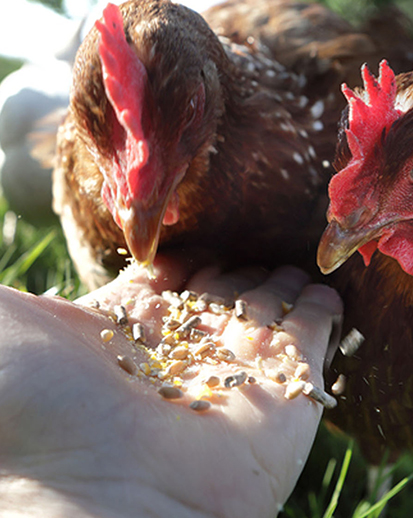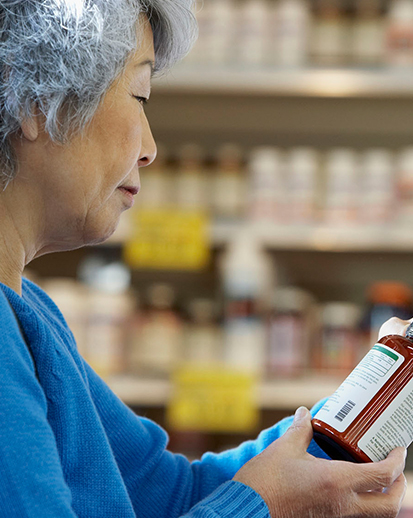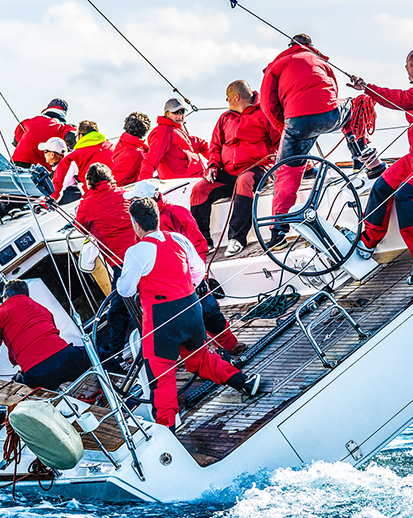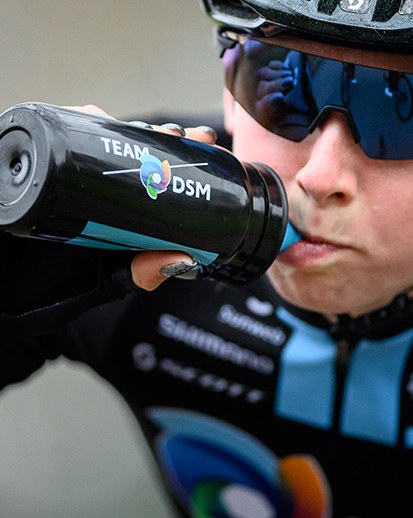Overall financial results
Strategy
At our Virtual Investor Event in November 2020, we reiterated our purpose-led, performance-driven growth strategy. Sustainability and innovation are key growth drivers of DSM’s long-term focused strategic plan, and are underpinned by ambitious targets across People, Planet and Profit. In markets related to Nutrition, Health and Sustainable Living, DSM is well positioned to use its capabilities to create a positive impact and deliver value for all the company’s stakeholders.
In Nutrition, we see significant headroom for business growth and innovation. The success of Nutrition’s unique business model combining ‘global products’ and ‘local solutions’ is evident from its track record of 6% organic sales growth and a 10% Adjusted EBITDA growth CAGR 2015–2020. Recent acquisitions such as CSK, Glycom and Erber Group further strengthened our value proposition to customers. Going forward, Nutrition will maintain strong growth by building on its ‘global products, local solutions’ business model. In addition, we will add a third leg through driving Precision & Personalization, by building on our big data, digital and bioscience capabilities.
In Materials, we have strong growth and earnings potential, and are well positioned in the strategic area of Sustainable Living. Following the announcement of the sale of our Resins & Functional Materials businesses to Covestro AG, Materials’ activities now consist of DSM Engineering Materials and DSM Protective Materials. We will continue to develop these into a more resilient, higher-growth, and high-margin specialty business. Their combined offering addresses the increasing demand for materials that protect the health of both people and planet by adding further bio-based and circular solutions.
Overall, we aim to deliver mid-single digit percentage organic sales growth, an above 20% Adjusted EBITDA margin, and high-single digit percentage Adjusted EBITDA growth on a mid-term basis in both Nutrition and Materials, supported by our strong innovation pipeline.
Financial results
This section includes an overview of the key financial metrics of the company in respect of our continued operations performance in 2020 and 2019, except where otherwise indicated.
In 2020, the COVID-19 pandemic led to unprecedented global challenges. We took very prompt action to ensure the health and safety of our employees and partners, while keeping operations running to maintain continuity of supply to our customers. Overall, the pandemic had a slightly negative effect on Group sales, as Materials saw a negative sales impact of around 10% on volumes over the course of the year, due to reduced global demand in the second and third quarters. Nutrition saw an overall slightly positive sales impact from the effects of COVID-19, mainly due to very strong demand in Human Nutrition for immunity-optimizing products.
Overall, we delivered solid financial results in this challenging environment and despite significant foreign exchange effects. We reported €1,534 million in Adjusted EBITDA, 1% down compared to 2019. We achieved good results in Nutrition, while Materials was significantly impacted by COVID-19. The Adjusted EBITDA in the businesses was also supported by the contribution of our innovation pipeline, our recent acquisitions, and our continued focus on cost reduction and operational efficiency, including prompt actions to minimize capex and operating costs in Materials in order to mitigate the effects of the pandemic. Adjusted net operating free cash flow from continuing operations increased by 18% compared to 2019 to €872 million.
Compared to 2019, Nutrition delivered above-market sales growth, with organic sales up 6% and a corresponding Adjusted EBITDA growth of 7%. Nutrition sales saw a slightly positive impact from the effects of COVID-19 overall. Human Nutrition & Health experienced a strong increase in demand for immunity-optimizing products. Animal Nutrition & Health witnessed good demand growth, but experienced some volatility in sales performance during the second and third quarters due to stocking effects at customers resulting from the supply chain uncertainty caused by COVID-19. Food Specialties saw good demand for packaged food applications driven by higher at-home consumption. Personal Care was weak due to lower demand for sun care and cosmetics, while Aroma Ingredients saw good demand for detergents and disinfectants.
The performance of our Materials cluster was significantly impacted by COVID-19, resulting in -6% volume development in 2020. Demand declined abruptly at the end of the first quarter. Following a slow recovery over the summer, Materials saw a strong improvement from September onwards, especially in Engineering Materials, directly related to demand for automotive.
The Adjusted EBITDA margins were 21.0% and 17.9% for Nutrition and Materials respectively, in line with our strategic ambitions. In Nutrition, the Adjusted EBITDA margin was up to 21.0% versus 20.7% in the same period last year, owing to strong sales in Human Nutrition & Health. In Materials, the Adjusted EBITDA margin was 17.9% compared to 21.3% in 2019, owing to the impact of COVID-19.
x € million |
|
2020 |
|
2019 |
|
Change |
|
|
|
|
|
|
|
Net sales from continuing operations |
|
8,106 |
|
7,998 |
|
1% |
Adjusted EBITDA from continuing operations |
|
1,534 |
|
1,551 |
|
-1% |
EBITDA from continuing operations |
|
1,368 |
|
1,457 |
|
-6% |
Adjusted operating profit from continuing operations |
|
929 |
|
989 |
|
-6% |
Operating profit from continuing operations |
|
662 |
|
872 |
|
-24% |
Adjusted net profit from continuing operations |
|
711 |
|
752 |
|
-5% |
APM adjustments from continuing operations |
|
(254) |
|
(63) |
|
303% |
Net profit from continuing operations |
|
457 |
|
689 |
|
-34% |
Net profit from discontinued operations |
|
51 |
|
75 |
|
-32% |
Net profit for the year |
|
508 |
|
764 |
|
-34% |
|
|
|
|
|
|
|
Net profit available to equity holders of Koninklijke DSM N.V. |
|
506 |
|
758 |
|
-33% |
|
|
|
|
|
|
|
ROCE (in %, continuing operations) |
|
10.4 |
|
12.3 |
|
|
Adjusted EBITDA margin (in %, continuing operations) |
|
18.9 |
|
19.4 |
|
|
Adjusted net operating free cash flow |
|
955 |
|
801 |
|
|
Net sales and Adjusted EBITDA
At €8,106 million, net sales from continuing operations in 2020 were 1% higher than in 2019 (€7,998 million). Organic growth in 2020 was 2%. Volume development was 3%, while price/mix had a 1% negative effect on growth compared to 2019. Exchange rate fluctuations had a negative impact of 3%, and acquisitions contributed another 2% to sales.
High-growth economies together currently represent 43% of our sales (44% when Africa is included), which is slightly lower than in 2019. The share of sales in these economies as a proportion of our total sales gives us a well-balanced global footprint.
The Adjusted EBITDA (Adjusted operating profit before depreciation and amortization) for continuing operations decreased by 1%, or €17 million, from €1,551 million in 2019 to €1,534 million in 2020. Adjusted EBIT (Adjusted operating profit) from continuing operations decreased from €989 million in 2019 to €929 million in 2020, down 6%.
|
|
Net sales |
|
Adjusted EBITDA |
||||||||
x € million |
|
2020 |
|
2019 |
|
% change |
|
2020 |
|
2019 |
|
% change |
|
|
|
|
|
|
|
|
|
|
|
|
|
DSM, continuing operations |
|
8,106 |
|
7,998 |
|
1% |
|
1,534 |
|
1,551 |
|
-1% |
Nutrition |
|
6,365 |
|
6,028 |
|
6% |
|
1,338 |
|
1,250 |
|
7% |
Materials |
|
1,518 |
|
1,744 |
|
-13% |
|
272 |
|
372 |
|
-27% |
Innovation Center |
|
184 |
|
184 |
|
0% |
|
21 |
|
26 |
|
-19% |
Corporate Activities |
|
39 |
|
42 |
|
-7% |
|
(97) |
|
(97) |
|
0% |
Net profit
Adjusted net profit from continuing operations of €711 million was down by 5% versus 2019. Net profit available to equity holders of DSM decreased by €252 million to €506 million. This decrease was mainly a result of the higher APM adjustments (up by €191 million, mainly due to restructurings and impairments). Expressed per ordinary share, net earnings from continuing operations amounted to €2.64 in 2020 (2019: €3.85).
Financial income and expense decreased by €25 million year on year to €67 million. This was mainly caused by the impact of the accounting for certain renewable energy contracts and lower interest margins and lower cash balances compared to the previous year.
The reported effective tax rate over taxable result excluding APM adjustments 2020 for continuing operations was 18.5% (2019: 19.1%). This decrease was mainly due to the one-time impact on the deferred tax position caused by the increase of the tax rate in Switzerland in 2019.
Adjustments made in arriving at DSM’s Alternative performance measures (APM adjustments)
Total APM adjustments from continuing operations for the full year amounted to a loss of €254 million (2019: loss of €63 million), consisting of a loss in EBITDA of €166 million (including restructuring costs of €103 million and acquisition/divestment costs of €52 million), impairments of €101 million, a related tax benefit of €54 million, and a loss of €41 million relating to associates and joint ventures (mainly the impairment of the POET-DSM joint venture).
Net sales by destination
in %
Net sales by origin
in %
Net sales by business segment
in %
Net sales by end-use market
in %
Net sales bridge 2020
x € million
Adjusted EBITDA margin
in %
x € million |
|
20201 |
|
2019 |
||||
|
|
|
|
|
||||
Cash and cash equivalents at 1 January |
|
800 |
|
1,281 |
||||
|
|
|
|
|
||||
Cash provided by operating activities |
|
1,494 |
|
1,385 |
||||
Cash from / (used in) investing activities |
|
(1,482) |
|
(525) |
||||
Cash from / (used in) financing activities |
|
83 |
|
(1,332) |
||||
Effect of exchange differences |
|
(24) |
|
(9) |
||||
Cash and cash equivalents at 31 December |
|
871 |
|
800 |
||||
|
||||||||
Cash provided by operating activities of €1,494 million mainly consists of the EBITDA for the year (€1,476 million). Our focus on cash flow resulted in a full-year operating cash flow that was €109 million higher than last year. This was driven by various items, including improved working capital performance, lower costs for defined benefit plans and higher customer funding (see also Consolidated financial statements).
The cash used in investing activities included capital expenditure (-€609 million) and acquisitions (-€1,533 million, including Erber Group and Glycom), partly offset by the withdrawal from fixed-term deposits (€646 million).
The cash from financing activities consisted mainly of the new corporate bonds (€991 million), partly offset by dividend paid (€289 million), the repurchase of shares (€309 million) and repayment of loans (€268 million).
For the full cash flow statement, see the primary statement in the Consolidated financial statements.
Balance sheet
The balance sheet total (total assets) reached €14.4 billion at year-end (2019: €13.4 billion). Equity decreased by €348 million, which was fully attributable to the exchange rate impact on foreign operations of €451 million. Equity as a percentage of total assets decreased from 58% to 52%.
Compared to year-end 2019, net debt increased by €1,433 million to €2,577 million, mainly due to the acquisitions of Glycom and Erber Group. The gearing at year-end was 25.6%, which is roughly double the gearing of 12.7% at year-end 2019.
Capital expenditure on intangible assets and property, plant and equipment amounted to €573 million for continuing operations in 2020 (€533 million on a cash basis), which was roughly the same as the level of amortization and depreciation.
Total working capital from continuing operations amounted to €1,580 million compared to €1,743 million at year-end 2019. This represents 19.0% as a percentage of annualized fourth-quarter 2020 sales (2019: 22.5%), which is below our aspiration of 20%. Cash-wise, the operating working capital (OWC) from continuing operations was comparable to last year (a decrease of €8 million). The OWC percentage decreased from 27.6% at year-end 2019 to 24.6% of annualized sales at year-end 2020.
Cash and cash equivalents came to €871 million at the end of the year; including current investments, this amounted to €914 million (2019: €1,488 million). Besides the regular cash flow elements, this decrease was mainly due to acquisitions (€1,533 million), the new bonds (€991 million) and the repurchase of shares (€309 million).
|
|
2020 |
|
2019 |
||||
|
|
x € million |
|
in % |
|
x € million |
|
in % |
|
|
|
|
|
|
|
|
|
Intangible assets |
|
4,455 |
|
31 |
|
3,515 |
|
26 |
Property, plant and equipment |
|
3,774 |
|
26 |
|
4,040 |
|
30 |
Other non-current assets |
|
710 |
|
5 |
|
664 |
|
5 |
Cash and cash equivalents |
|
871 |
|
6 |
|
800 |
|
6 |
Other current assets |
|
4,554 |
|
32 |
|
4,424 |
|
33 |
Total assets |
|
14,364 |
|
100 |
|
13,443 |
|
100 |
|
|
|
|
|
|
|
|
|
Equity |
|
7,487 |
|
52 |
|
7,835 |
|
58 |
Provisions |
|
184 |
|
1 |
|
168 |
|
1 |
Other non-current liabilities |
|
4,490 |
|
32 |
|
3,325 |
|
25 |
Other current liabilities |
|
2,203 |
|
15 |
|
2,115 |
|
16 |
Total equity and liabilities |
|
14,364 |
|
100 |
|
13,443 |
|
100 |
Outlook 2021
DSM expects to deliver an Adjusted EBITDA increase in Nutrition at the upper end of its mid-term strategic ambition of high-single digit growth. Together with continued recovery in Materials, DSM expects an Adjusted EBITDA growth rate for the Group moving into double digits, with a continued good Adjusted net operating free cash flow.
Primary energy is energy that has not yet been subjected to a human engineered conversion process. It is the energy contained in unprocessed fuels.
Final (consumed) energy is the energy that is consumed by end-users. The difference between primary energy and final consumed energy is caused by the conversion process between the two as well as any transmission losses.







